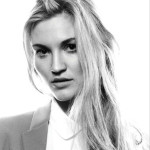I’m on my phone, typing the same text over and over again, erasing each time. I watch “One day you guys will understand what I’ve been doing all these years” disappear in reverse, a blinking cursor eating my discontent, letter by letter, word by word. I chew on the frustration for five minutes, debating whether to fully express myself or to keep quiet, fill the chip on my shoulder with a bit of gauze and conserve my energy.
That chip. It’s a giant, crippling gouge. It is something that haunts many of my old relationships, though not necessarily my new ones. New friends know the new me: Jenny Bahn who is a writer, who sits at a computer every day feeling the carpel tunnel swelling in her wrists, who is surrounded by notebooks and journals and little pieces of paper with things like “she keeps mistaking diamonds for broken glass” scribbled unintelligibly. Old friends see a model with a cute hobby they rarely ask about. Juvenile as it may be, my goal in life is to prove these people wrong, to make them regret every doubt, every condescension, every question unasked. One day I will be something, I think, and I will remember you.
In life there are the people who believe in you, and there are the people who do not. For the latter, it is often less an active intention than it is a laziness of mind, an unwilling curiosity. Until someone asks questions — refreshes the dialogue, so to speak – you remain embalmed as you were, for weeks, months, years, frozen in time.
Today, I have just asked an old friend for a favor for a publication I write for, which he immediately tried to shake off, expecting that anything I am working on is embarrassing or inferior or something not worth him sticking his neck out for. I tersely accuse him of having zero faith in me as a person. “I didn’t even know you were writing for ___________!” my friend argues, which only makes it worse. I’ve been working for them for over a year. It’s easier for him to imagine me sitting in my apartment painting my toenails, going to castings, finding my light.
Sometimes I imagine my transition from modeling into something else is comparable to Pretty Woman – with Richard Gere turning Julia Roberts’ character from a Lycra-wearing, red-lipped prostitute into his polo-watching girlfriend. Gere was able to see past the street walking, the knee-highs, her sordid past. In his mind, she had a future as another person, a woman who shopped in designer stores, who ate at good restaurants. But no matter how many diamonds she wore, how many red gowns she traipsed around in, there would always be that creepy Jason Alexander type who, uninvited, would put his hand on her knee, expecting that old trade.

















